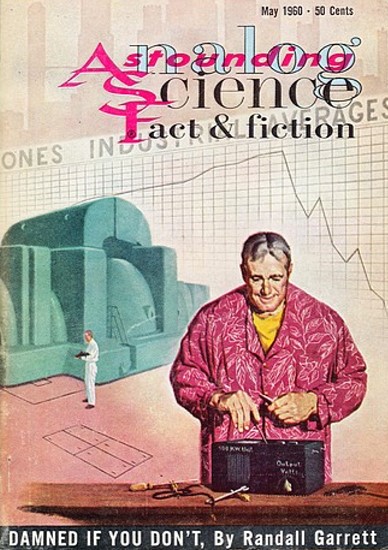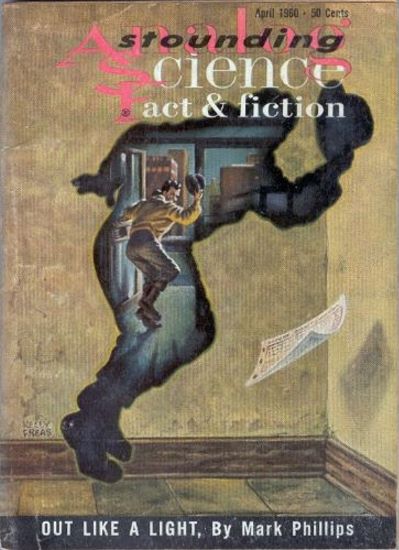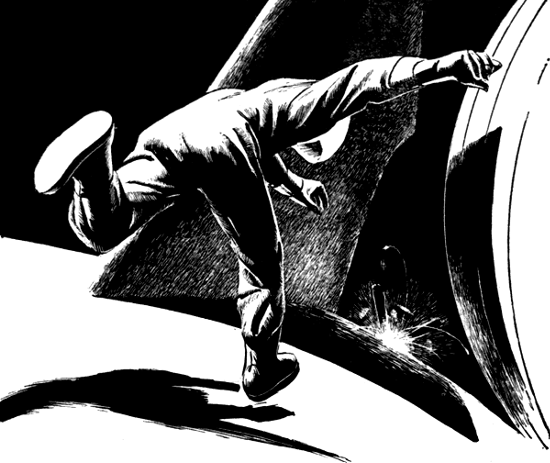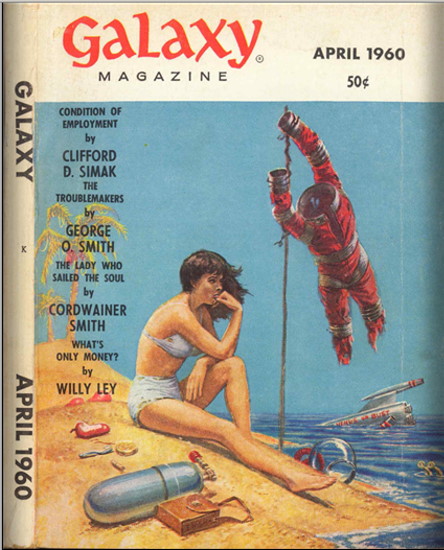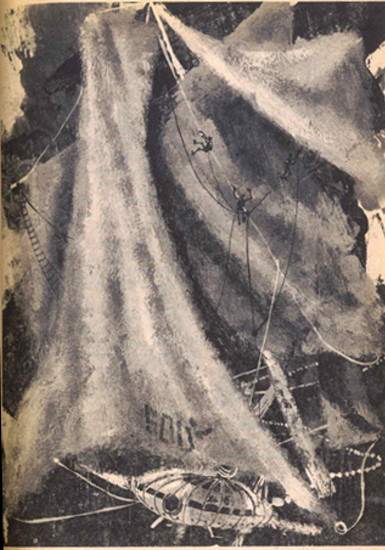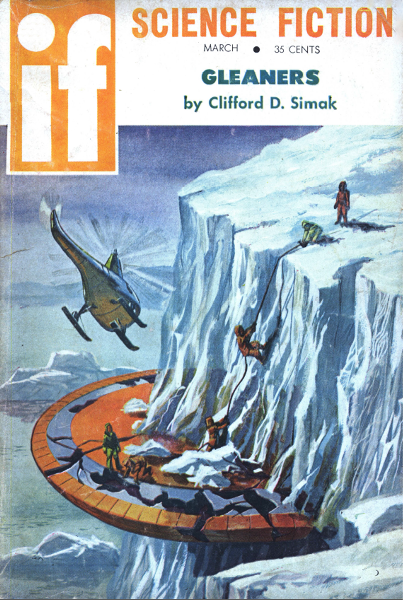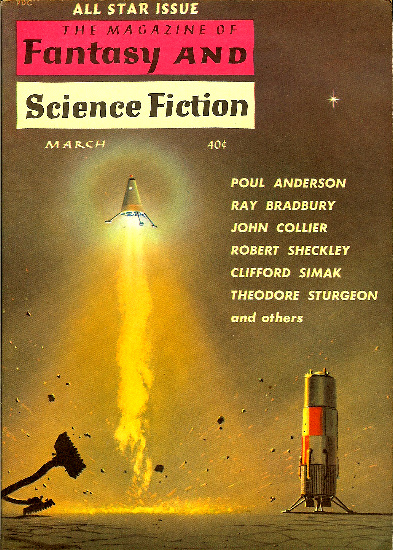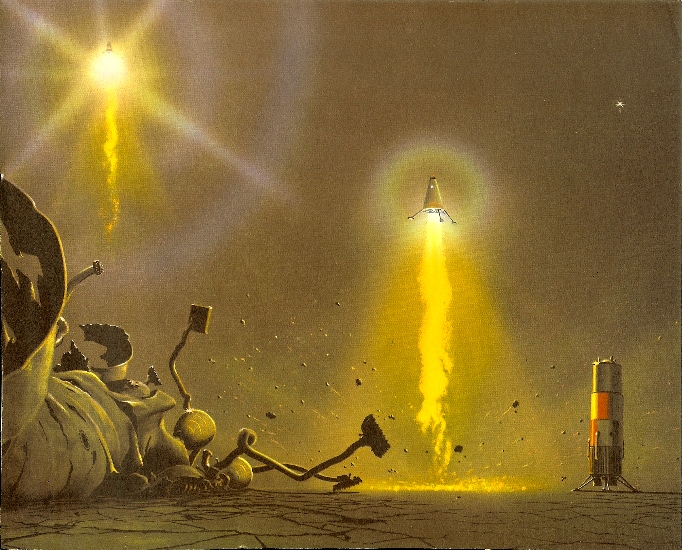Every month, there is the perennial hope that this will be the month a truly great story will be published. Every month, a stack of science fiction digests arrives at my door. There are few moments as exciting as that day (my postman holds them all so they arrive at once; I like big events). With great enthusiasm, I tear into my magazines. Sometimes the promise is fulfilled. Sometimes it isn't.
The Magazine of Fantasy and Science Fiction most consistently delivers the stand-out stories, so I usually save it for last. Other months, I am a greedy child and eat dessert first. This time around, I split the difference.

First up is Fritz Leiber's short story, The Oldest Soldier. It's a good piece, very atmospheric. I originally thought it was another story about an immortal, a la Long Live Walter Jameson, the Twilight Zone episode, but upon further reflection, I think it's about one of the many time traveling soldiers in Leiber's The Big Time universe.
Fred McMorrow follows Leiber with the thematically similar, The Man from Tomorrow. It takes place in a New York steak and booze joint. A reporter and a crustily jovial bartender are debating the appeal of gambling when they are accosted by a fellow from the future. As a time traveler, the man has a perfect knowledge of events, and as a marooned prisoner of the 20th Century knowing everything that will happen (down to the most minute detail, it seems, and with no ability to alter events), he is miserable with boredom.
The reader is left with the question: Is it better to know the future and capitalize upon it, or to revel in the uncertainty of what's to come?
I did not like Rex Lardner's American Plan, about a fellow who goes to Mars as a tourist and ends up a prisoner in his hotel. As Damon Knight says in his book review column, it is not sufficient to slap a few science fiction trappings (in this case, a Martian setting) onto an otherwise conventional story and call it "genre."
John Collier's That Tender Age (a New Yorker reprint) is even worse. A would-be lodger interviews with potential landlords. He has a nomadic history, and he's had experience sojourning with cannibals. Early on, he makes it clear, inadvertently, that he has predatory designs upon the landlord's daughter, and at the end, cannibal and landlord's daughter head off to the woods, hand-in-hand, presumably never to return.
What makes this story unbearable is its run-on construction, with no quotation marks or attributions of expression. While Collier does indicate who is speaking through tone and use of proper nouns, it's tedious going. Moreover, the end is telegraphed from the beginning, which makes the conclusion all the more ridiculous. At least it's short.
Gordy Dickson has One on Trial, a short story about a ruthless executive who is forced to go on a sort of robotic safari as penance for his sins. Never one to play by the rules, he finds his own way out, unrepentant and unchanged. Not bad.
A Specimen for the Queen is the conclusion (?) to Arthur Porges' "Ruum" series, in which a taxidermist alien robot is deposited in the backwoods of Canada to assemble a preserved zoological collection. In the millions of years that the robot has been on Earth, it has amassed quite an exhibit, including one sentient biped. In this story, the robot encounters a detachment of Galaxy-conquering human-sized bees, who have mounted a scouting expedition to the Canadian wilds.
Has the robot finally met its match? Or are the bees grasping a tiger by its tail? Entertaining, if somewhat disturbing.

Dr. Asimov has a fascinating (if you are mathematically inclined) article on the fundamental constant, Pi. Of particular interest, to me anyway, was his presentation of Liebniz's series, which can be used to calculate Pi, provided one has a lot of spare time. It's quite simple: 4/1-4/3+4/5-4/7+4/9… and so on. You can do it with a pen and paper, but it will take you hundreds of thousands of iterations to get close to the answer, since you'll keep bouncing high and low around it.
Or, you can do what I did and rent some time on a local computer; I borrowed the university's lightning-fast IBM for a few hours. I cleverly reduced the computation time by having my program calculate the average of the last two numbers in the sequence (since one is an upper bound, and the other is a lower bound, to the value of Pi, the actual value must be somewhere about halfway). After 20,000 iterations, I narrowed Pi down to 3.1415926. Good enough for government work!
Finally, we come to Philip Jose Farmer's Open to me, my sister. Lane, the lone surviving astronaut of a five-man expedition to Mars discovers a wildly alien symbiotic biology. This beautifully described, but somewhat simplistic, set of species is responsible for the life-giving canals of Mars, which are actually biologically constructed water transport tubes.
Stranger still is Martia, also a lone survivor, but from a different solar system, who shelters Lane after he nearly drowns in one of Mars' natural hydroponic pools. Tantalizingly humanoid but repulsively alien, she and Lane enjoy a budding friendship and attraction over 25 fascinating, well-written pages. Near the end, Lane discovers how Martia's race breeds—an exchange of an internally carried worm-like parasite.
Whereupon, revolted by his attraction to a female with such a shocking sex life, Lane goes beserk, binds Martia, and kills her parasite. Lane is, soon after, captured by some of Martia's people, who plan to rehabilitate him (to Lane's horror).
It was such an unnecessarily violent end to such a beautiful story. Moreover, it was implausible. Early on, Farmer took great pains to describe Lane as a fellow in touch with his "feminine" side, able to bend ideologically without breaking. And yet, by the end, Lane cannot suffer this threat to his machismo. He cannot love/lust after an alien whose reproduction is, to him, so distasteful.
I get what Farmer is trying to do here, but I don't like it.
Which raises another question: What's worse? Consistent mediocrity, or the promise of greatness capped by a disappointing ending? Both the story and the issue fall into the latter category.
Ah well. There's still one more magazine to go.

Cover by Mel Hunter
P.S. I have exciting news! Very soon, the format of this column will change, and all of you lovely readers can get automatic notification (via instant telegraphic message) whenever a new piece is published.
P.P.S. I have found a kindred spirit, though his focus is both more scattershot chronologically and focused topically: Science Fiction Ruminations
—
(Confused? Click here for an explanation as to what's really going on)










